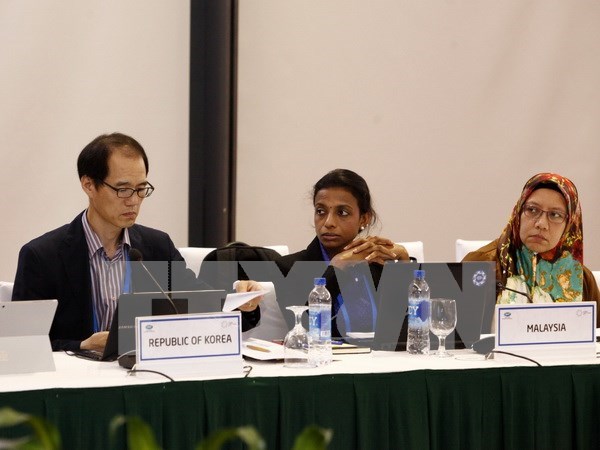Workers need to improve skills to meet digital age requirements
Vietnamese workers should improve their skills and knowledge in order to make themselves adaptive to scientific and technological development in the digital age, said a local expert.
 Delegates at the Adhoc Group Meeting (Source: VNA)
Delegates at the Adhoc Group Meeting (Source: VNA)Hanoi (VNA) - Vietnamese workers should improve their skills and knowledge in order to make themselves adaptive to scientific and technological development in the digital age, said a local expert.
Dr. Dao Quang Vinh, Director of the Institute of Labour Science and Social Affairs under the Ministry of Labour, Invalids and Social Affairs, told Vietnam News Agency reporters that there remains a certain gap between human resources of Vietnam and other economies in the region.
He cited statistics in 2016 showing that the rate of trained workers in Vietnam was only 20.6 percent and most labourers work in agriculture and simple production areas.
Compared to those in other APEC economies, Vietnam’s workforce shows limitations in soft skills, foreign languages, teamwork capacity, information technology and creativity, he said.
Therefore, Vietnam should take concerted measures to improve its human resources quality, with focus on renovating the country’s education and training system, Vinh suggested.
The government needs to have policies to encourage schools and education establishments to reform training methods in the direction of aligning training with market demands, he said, adding that businesses also need to update knowledge and new technologies regularly.
In his keynote presentation at the APEC High-Level Dialogue on Human Resources Development in the Digital Age in Hanoi on May 15, David Lamotte, International Labour Organisation (ILO) Deputy Regional Director for the Asia and Pacific Region, said that individuals, particularly young people who represent a significant proportion of the working population, should take a proactive approach to lifelong learning in order to have more options to enter new economic activities and industries.
Core or soft skills are necessary for individuals, especially the youth, to obtain the skills, knowledge and competence that could enhance their ability to secure and retain a job, progress at work and cope with changes, he noted.
They are most employable when they have broad-based education and training, basic and portable high-level skills, including team-work, problem solving, information and communications technology, and communication and language skills, he added.
According to Alan Bollard, Executive Director of the APEC Secretariat, not only developing economies but also developed ones are seeking ways to get new skills and new education and training for young people to obtain jobs and for the aging workforce to improve skills.
Vietnam should host workshops to share experience and find different ways to address challenges from the digital age, he suggested, noting that as the economy is expected to be highly integrated in the future, with new forms of trade, human resources must satisfy new skills.
As an initiative of Vietnam, the High-Level Dialogue on Human Resources Development in the Digital Age was designed to address three major concerns facing the world of work, namely future of work in the age of automation and digitisation, education and training needs to meet the demands of the new economy, and broad implications for the labour market.
The dialogue was expected to adopt an APEC framework on human resources development in the digital age and recommended actions on strengthening and enhancing social protection towards social inclusion in the region.-VNA











